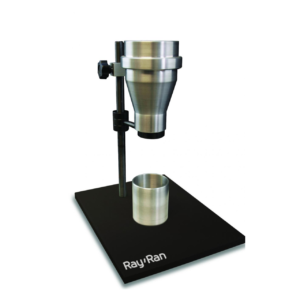การทดสอบความหนาแน่นของพลาสติก – Plastic Density Testing
การทดสอบความหนาแน่นของพลาสติกและโพลิเมอร์เป็นสิ่งสำคัญในการประเมินคุณภาพและประสิทธิภาพของผลิตภัณฑ์ การทดสอบนี้ช่วยให้สามารถคาดการณ์พฤติกรรมของวัสดุได้อย่างแม่นยำ
ทำไมต้องทดสอบความหนาแน่นของพลาสติกและโพลิเมอร์? การทดสอบความหนาแน่นช่วยระบุความแตกต่างของโครงสร้างและองค์ประกอบของวัสดุ ใช้ตรวจสอบความสม่ำเสมอของตัวอย่าง และคาดการณ์พฤติกรรมของวัสดุภายใต้สภาวะต่างๆ
ความหนาแน่นเกี่ยวข้องกับคุณสมบัติหลักหลายประการ เช่น ความยืดหยุ่น ความแข็งแรง และความต้านทานต่อการแตกหัก นอกจากนี้ ยังใช้ในการคำนวณอัตราส่วนความแข็งแรงต่อน้ำหนักของพลาสติกและโพลิเมอร์
วิธีการทดสอบความหนาแน่นของพลาสติกและโพลิเมอร์
วิธีการแบบคอลัมน์ความหนาแน่น (Density Gradient Columns): เป็นวิธีการที่ไม่ทำลายตัวอย่าง สามารถวัดความหนาแน่นได้อย่างแม่นยำถึง 6 ตำแหน่งทศนิยม โดยใช้ของเหลวผสมกันอย่างน้อย 2 ชนิดสร้างคอลัมน์ความหนาแน่น และใช้ลูกแก้วที่ปรับเทียบแล้วเพื่อปรับเทียบคอลัมน์ จากนั้นนำตัวอย่างวัสดุที่จะทดสอบใส่ลงไป เมื่อถึงจุดสมดุล สามารถหาความหนาแน่นของวัสดุได้
เครื่องมือทดสอบความหนาแน่นแนะนำ เครื่องวัดความหนาแน่น (Apparent Bulk Density Apparatus Ray-Ran): วัด ความหนาแน่นจำนวนมาก และความสามารถในการไหลของวัสดุพลาสติก เช่น ผงพลาสติก สอดคล้องกับมาตรฐาน ISO Method R60
Plastic Density Testing: More Than Meets the Eye
If you want to know how plastics and polymers will perform over time, then plastic density testing should be high on your list of priorities. Whether QA testing plastic films for flexible packaging or polymers used in medical devices, being able to assess the density accurately and repeatedly is essential as this can reveal potential weaknesses not visible to the human eye!
Why test the density of plastic and polymers?
Plastic and polymer density testing can be used to discover variations in structure and overall composition and is an important method for determining the uniformity of a sample. This knowledge makes it possible to predict the behavior of the sample over time and in a variety of situations.
- The density of molded plastic is an indicator of how well such parts perform.
- Density is related to a number of key performance indicators, such as flexibility, strength and crack resistance.
- Density is also useful for calculating the strength to weight ratio of plastics and polymers.
Density testing methods for plastics and polymers
One of the most popular non-destructive density testing solutions for plastics comes about through the use of Density Gradient Columns. These offer the ability to read density measurements extremely accurately, typically to 6 decimal places. They use at least 2 miscible liquids to build the density gradient and calibrated glass floats are used to calibrate the column. The test material is then added. Once at equilibrium, the density of the material can be found.
Density testing solutions for plastics and polymers
There are a variety of different methods and solutions for accurately testing the density of plastics and polymers. A few of our highlighted solutions include:
Apparent Bulk Density Apparatus Ray-Ran is a fast and reliable instrument measurement of apparent density, bulk factory and the pourability of plastic materials such as molding powders. It offers a measuring method for determining the apparent density of molding material that can be poured readily through a specified funnel compliant with ISO Method R60.
Ray-Ran Auto Density Measurement System uses the gradient column method to calculate the density measurement of a specimen to 6 decimal places. It has been designed with operator simplicity in mind and has an on-board LCD screen providing simple instruction.
Ray-Ran 6MPCA makes it possible to test the Melt Flow Index (MFI) and Melt Flow Rate (MFR) of polymers in a non-destructive way. It has a unique microprocessor and the multi slicing feature gives accurate MFR values plotted against piston displacement, which is all calculated from the density of the materials at test temperature.
Plastic density testing with Industrial Physics
With many years of experience in the testing of plastic and polymers in a wide range of industries, from flexible packaging to polymers in inks and coatings, Industrial Physics is perfectly placed to give you the help you need. Find the ideal density testing instrument for your set up and check out all of our complementary testing solutions, for comprehensive plastic testing.



